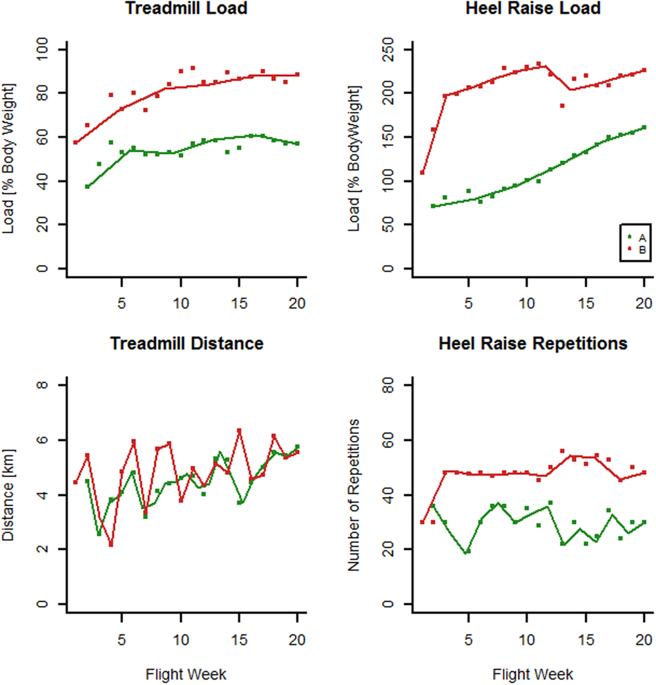npj Microgravity ( IF 4.4 ) Pub Date : 2018-09-17 , DOI: 10.1038/s41526-018-0052-1 Jörn Rittweger , Kirsten Albracht , Martin Flück , Severin Ruoss , Lorenza Brocca , Emanuela Longa , Manuela Moriggi , Olivier Seynnes , Irene Di Giulio , Leonardo Tenori , Alessia Vignoli , Miriam Capri , Cecilia Gelfi , Claudio Luchinat , Claudio Franceschi , Roberto Bottinelli , Paolo Cerretelli , Marco Narici

|
Spaceflight causes muscle wasting. The Sarcolab pilot study investigated two astronauts with regards to plantar flexor muscle size, architecture, and function, and to the underlying molecular adaptations in order to further the understanding of muscular responses to spaceflight and exercise countermeasures. Two crew members (A and B) spent 6 months in space. Crew member A trained less vigorously than B. Postflight, A showed substantial decrements in plantar flexor volume, muscle architecture, in strength and in fiber contractility, which was strongly mitigated in B. The difference between these crew members closely reflected FAK-Y397 abundance, a molecular marker of muscle’s loading history. Moreover, crew member A showed downregulation of contractile proteins and enzymes of anaerobic metabolism, as well as of systemic markers of energy and protein metabolism. However, both crew members exhibited decrements in muscular aerobic metabolism and phosphate high energy transfer. We conclude that countermeasures can be effective, particularly when resistive forces are of sufficient magnitude. However, to fully prevent space-related muscular deterioration, intersubject variability must be understood, and intensive exercise countermeasures programs seem mandatory. Finally, proteomic and metabolomic analyses suggest that exercise benefits in space may go beyond mere maintenance of muscle mass, but rather extend to the level of organismic metabolism.
中文翻译:

Sarcolab初步研究骨骼肌对长期航天的适应
太空飞行导致肌肉消瘦。Sarcolab的初步研究调查了两名宇航员,涉及足底屈肌的大小,结构和功能以及潜在的分子适应性,以进一步了解肌肉对太空飞行的反应和运动对策。两名机组人员(A和B)在太空度过了6个月。机组人员A的训练程度不如B。飞行后,A的足底屈肌容量,肌肉结构,力量和纤维收缩力明显下降,B则明显减轻。这些机组成员之间的差异密切反映了FAK-Y397的丰度肌肉加载历史的分子标记。而且,机组A显示出厌氧代谢的收缩蛋白和酶的下调,以及能量和蛋白质代谢的系统性标记。但是,两名机组人员的肌肉有氧代谢和磷酸盐高能量转移均表现出下降。我们得出结论,对策可能是有效的,尤其是在抵抗力足够大的情况下。但是,要完全防止与空间相关的肌肉退化,必须了解受试者之间的差异,并且强化运动对策计划似乎是强制性的。最后,蛋白质组学和代谢组学分析表明,太空锻炼的益处可能不仅限于维持肌肉质量,还扩展到了生物代谢水平。特别是当阻力足够大时。但是,要完全防止与空间相关的肌肉退化,必须了解受试者之间的差异,并且强化运动对策计划似乎是强制性的。最后,蛋白质组学和代谢组学分析表明,太空锻炼的益处可能不仅限于维持肌肉质量,还扩展到了生物代谢水平。特别是当阻力足够大时。但是,要完全防止与空间相关的肌肉退化,必须了解受试者之间的差异,并且强化运动对策计划似乎是强制性的。最后,蛋白质组学和代谢组学分析表明,太空锻炼的益处可能不仅限于维持肌肉质量,还扩展到了生物代谢水平。











































 京公网安备 11010802027423号
京公网安备 11010802027423号